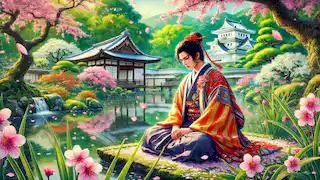The Tale of Genji
Reading Time: 6 min
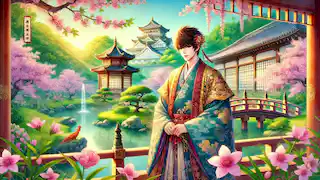
About Story: The Tale of Genji is a Historical Fiction from japan set in the Medieval. This Poetic tale explores themes of Romance and is suitable for Adults. It offers Cultural insights. A timeless journey of love and power in the Heian court.
In the Heian period of Japan, amidst the splendor and elegance of the imperial court, there was a man whose beauty, grace, and talent were unparalleled. This man was Hikaru Genji, the Shining Prince, born to the Emperor and his beloved consort, Lady Kiritsubo. Though Genji's life was adorned with privilege and admiration, it was also marred by the complexities of love and duty, making his tale one of the most poignant in Japanese literature. Genji's birth brought joy and sorrow to the court. His mother, Lady Kiritsubo, was of lower rank, which caused jealousy among the Emperor's other consorts. Despite his father's profound love, Lady Kiritsubo faced severe hostility and passed away when Genji was just a child. The Emperor, devastated, found solace in Genji, who resembled his mother in beauty and grace. Genji was bestowed the title of "Hikaru," meaning "shining," for his radiant presence. However, due to political constraints, he was demoted to a commoner status to avoid the threat his lineage posed to the throne. Despite this, he received the finest education, mastering the arts, literature, and music, becoming the epitome of Heian courtly ideals. As Genji grew, his charm and talents blossomed, drawing the admiration of many. He was skilled in poetry, dance, and music, captivating everyone with his elegance. Yet, his heart yearned for the unattainable, leading him into complex romantic entanglements. One of his earliest loves was Lady Fujitsubo, his father's consort, who bore an uncanny resemblance to his mother. Their secret affair was fraught with tension and longing, reflecting the impossible love that haunted Genji. This forbidden relationship, though brief, left a profound impact on his soul, shaping his future romances. Genji's life was a tapestry of romantic encounters, each more intricate than the last. He married Aoi no Ue, a woman of high rank, but their relationship was strained by differences in temperament. Aoi's aloofness and Genji's wandering heart led to mutual dissatisfaction. Despite the birth of their son, Yugiri, the marriage remained troubled. Genji found solace in numerous other relationships. One notable affair was with Lady Rokujo, a passionate and jealous woman whose spirit haunted Genji even after her death. Their relationship was tumultuous, marred by intense emotions and jealousy that transcended the physical realm. Another significant love was Murasaki, whom Genji encountered as a child and later raised to be his ideal companion. Murasaki's gentle and understanding nature contrasted with Genji's other lovers, making her his most cherished partner. Their relationship, though initially controversial, became the bedrock of Genji's emotional life. Genji's rise in the court was not without challenges. He faced political intrigue, jealousy, and exile. His affair with Oborozukiyo, another imperial consort, led to scandal, forcing Genji into temporary exile in Suma. During this period, Genji reflected on his life, composing poetry and finding solace in nature's beauty. His exile ended when a storm prompted his return to the capital. The Emperor, recognizing Genji's value, reinstated him, allowing him to rebuild his influence. Genji's resilience and adaptability during these trials showcased his depth of character, making him a figure of admiration and envy. Upon his return, Genji's fortunes soared. He was granted the title of Minister of the Left and wielded considerable power within the court. His residence, the Rokujo-in, became a center of cultural and political activity, where he surrounded himself with artists, poets, and musicians. Genji's influence extended beyond the court, shaping the cultural and artistic landscape of his time. His patronage of the arts and dedication to aesthetic refinement set the standard for courtly elegance, leaving a lasting legacy on Japanese culture. As years passed, the vibrant energy of Genji's youth gave way to the contemplative serenity of age. He faced the inevitable loss of loved ones, including the untimely death of Murasaki, which plunged him into profound grief. Her passing marked a turning point in Genji's life, leading him to reflect on the transient nature of beauty and love. Genji's later years were marked by a sense of melancholy and introspection. He withdrew from the public eye, seeking solace in religious practices and nature. Despite his diminished presence at court, his influence remained, as his legacy continued to shape the cultural and political landscape. Genji's story did not end with his death. His son, Yugiri, and grandson, Kaoru, carried forward his legacy, navigating their own paths through the intricate web of courtly life. Their stories, though distinct, were imbued with the same themes of love, duty, and the quest for beauty that defined Genji's life. Kaoru, in particular, inherited his grandfather's sensitivity and romantic nature. His unrequited love for Oigimi and later for her sister Nakanokimi mirrored Genji's own experiences of longing and loss. The continuation of these themes through generations underscored the enduring nature of human emotions and the cyclical patterns of life. The Tale of Genji is not merely a story of a single man's life but a profound exploration of the human condition. It delves into the complexities of love, the impermanence of beauty, and the inevitable passage of time. Through Genji's experiences, the narrative reflects on the ephemeral nature of existence and the enduring impact of one's actions and emotions. The novel's rich tapestry of characters, each with their own stories and struggles, paints a vivid picture of Heian society. It captures the elegance, sophistication, and underlying tensions of the imperial court, offering a window into a world where aesthetics and politics were deeply intertwined. Genji's life, with its triumphs and tragedies, serves as a mirror to our own experiences. His pursuit of love and beauty, despite the inevitable pain, resonates across time and culture. The Tale of Genji invites readers to reflect on their own lives, the choices they make, and the fleeting moments that define their existence. The enduring appeal of Genji's story lies in its universal themes and its ability to evoke a deep emotional response. It reminds us of the interconnectedness of human experiences and the timeless quest for meaning and fulfillment. The Tale of Genji remains a cornerstone of Japanese literature, its influence extending far beyond its time. Its exploration of love, beauty, and the human spirit continues to inspire and captivate readers worldwide. As we journey through Genji's life, we are reminded of the delicate balance between joy and sorrow, the transient and the eternal, and the profound impact of one man's search for meaning in an ever-changing world. Thus, the story of Hikaru Genji, the Shining Prince, endures, a timeless reflection of the beauty and complexity of the human heart.The Shining Prince
The Blossoms of Youth
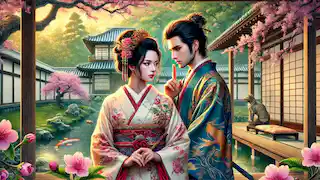
A Tapestry of Love
Trials and Tribulations
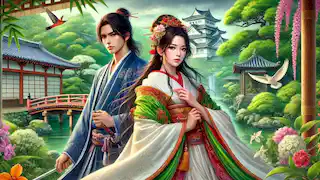
The Pinnacle of Power
The Autumn of Life

The Legacy of Genji
The Ephemeral and the Eternal
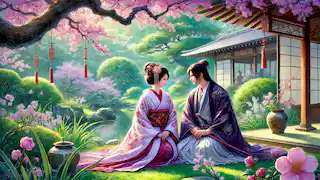
Reflections on Genji
The Eternal Tale
